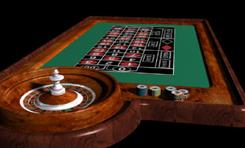Craps
History
THE VERY BEGINNING...PERHAPS
Like all gambling games, the history of the game of craps is a bit murky.
It has been alleged that a single die resembling that which is used in the
game was found in Egypt, and
 the determination was that is may date back to 600 B.C. There is evidence that there was an ancient Arabic game called "Az Zar," which means "the dice" in that language. The game, in some form, was reported to have been played by the ancient Chinese, soldiers of the Roman Empire, and Native Americans. It seems everyone liked games of chance.
the determination was that is may date back to 600 B.C. There is evidence that there was an ancient Arabic game called "Az Zar," which means "the dice" in that language. The game, in some form, was reported to have been played by the ancient Chinese, soldiers of the Roman Empire, and Native Americans. It seems everyone liked games of chance.
As far as the evolution of craps into the game it is today, that, according to some, can be traced to the Crusades, 1125 A.D. specifically, when English soldiers, including most notably Sir William Tyre, started to play it in the process of seizing an Arabian castle that was called "Hazart." Whether the Arabian influence was anywhere to be found in their adoption of the game is not clear. What is known, for the most part, is that at the point the English latched on to the game it became known as "Hazard."
Hazard contained many of the same principles that are part of craps as we know it - there was a shooter, known as the "caster" who threw the dice for the purposes of making a "main point," which had to total anywhere from five (5) to nine (9). Then the caster would attempt to make a "chance point," which had to be anything between four (4) and ten (10), and he kept throwing until he did. If the caster threw a two (2), three (3) or twelve (12), that would be termed a "crab" and he would be taken out of that role.
The game was obviously brought back to England, where it became wildly popular in the years to come. It is said that there was hardly a tavern in England that did not have the game of Hazard playing in some form. The popularity of the game was rather easy to understand, as it was, for one thing, a way of gambling, and it brought many social elements front and center into the activity.
It was also a game that was very popular among the upper crust in the country, and that is how much of the popularity had spread. Because France was in such close proximity to England, it was inevitable that Hazard would find its way across the English Channel. It did, in fact, and it became just as much of a sensation there.
Upon its arrival there, we then move into some of the confusion about how the modern name for this game was adopted. What is generally accepted is that the French wanted to call the game something different than what the English called it.
One account is that the name "craps" evolved from the French word "crapaud," which means "toad." That would be curious, but then again, much of this history, without a lot of documentation, is left open to much curiosity. Another story asserts that "craps" evolved out of a bastardization of the word "crabs," which was the word used to described the caster rolling the wrong number(s) and being replaced in the game.
All the stories are colorful, and any of them can be true, which also goes for the route this game took that eventually landed it in the United States.
We'll explore that next.
Craps in America
 the determination was that is may date back to 600 B.C. There is evidence that there was an ancient Arabic game called "Az Zar," which means "the dice" in that language. The game, in some form, was reported to have been played by the ancient Chinese, soldiers of the Roman Empire, and Native Americans. It seems everyone liked games of chance.
the determination was that is may date back to 600 B.C. There is evidence that there was an ancient Arabic game called "Az Zar," which means "the dice" in that language. The game, in some form, was reported to have been played by the ancient Chinese, soldiers of the Roman Empire, and Native Americans. It seems everyone liked games of chance.